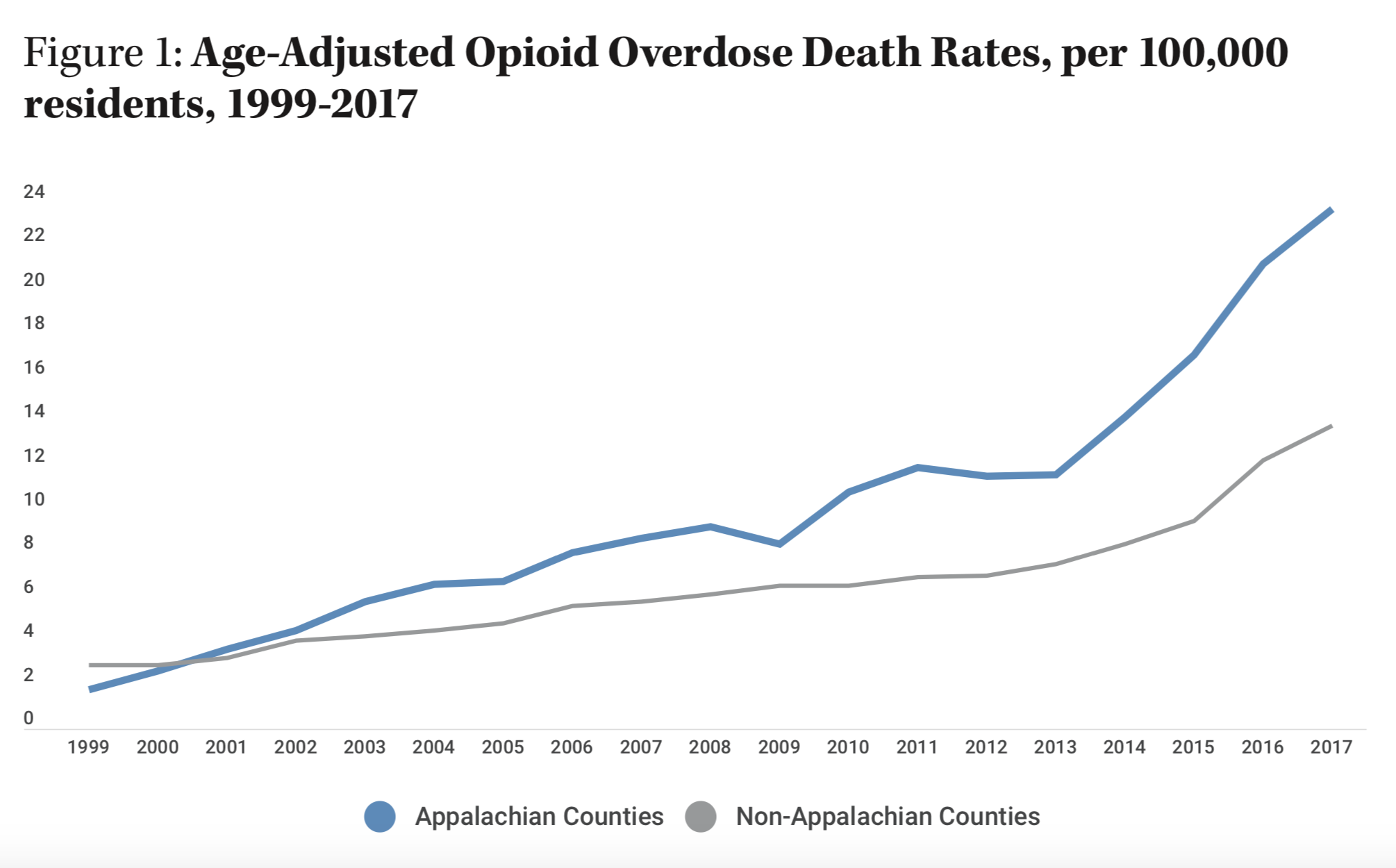Connecting state and local government leaders
New research from the National Association of Counties aims to provide local government officials with tools to combat the opioid crisis in Appalachia.
Rates of death from opioid overdose in Appalachia are significantly higher than in other parts of the country, placing financial strain on local governments that are already dealing with limited funding, according to new research from the National Association of Counties.
“Appalachian counties, especially, are struggling with these additional costs because the region generally has fewer resources than other counties,” says the report, titled “Opioids in Appalachia: The Role of Counties in Reversing a Regional Epidemic.” “In 2012, Appalachian counties generated 35 percent less revenue per capita (or $650 less) than non-Appalachian counties, and spent 38 percent—or approximately $711—less per resident than non-Appalachian counties.”
Like much of the country, Appalachia has struggled with rampant opioid use for more than a decade. But the problem remains more pronounced in the region than in other parts of the country. “In 2017,” the report says, “opioid prescription rates were 45 percent higher in Appalachian counties than in the remainder of the country, and rates have consistently remained at least that much higher since 2006.”

The socioeconomic makeup of the region exacerbates the problem. Poverty, poor health, low levels of education and high unemployment combine to create “an environment in which opioid misuse flourished...more easily than in other parts of the nation, resulting in a crisis that has hurt both county residents and the county governments that serve them.”
But even with those challenges, local leaders are in positions to help. The report offers “action steps” for counties, broken into five categories— leadership, prevention, recovery, rehabilitation for justice-involved individuals and economic development—designed to “aid Appalachian county leaders in their efforts to formulate effective, efficient and sustainable responses to the opioid epidemic.”
Each action step is presented with a real-life case study of a county that experienced success in combating the problem. Under leadership, for example, the report recommends that county officials set a “tone of compassion” during conversations about addiction to help remove the stigma surrounding the topic, form opioid task forces made up of faith-based leaders and other stakeholders, and reach out to surrounding counties and municipalities to formulate regional strategies.
“These groups foster community collaboration and can help with securing resources and coordinating services,” the report says.
Officials in Ross County, located in south-central Ohio, found success with some of those strategies. The county recorded 112 fatal overdoses between 2014 and 2016, the state’s third-highest overdose mortality rate.
In response, the county launched the Hope Partnership Project, a “multidisciplinary team of federal, state and local agencies tasked with building a comprehensive, community-based strategy” to address the opioid crisis and its effects on the community. The county’s Alcohol Drug Addiction and Mental Health Services Board is starting a state-funded program to “reimburse employers for drug testing, train supervisors on how to manage individuals in recovery and establish a forum for information exchange among employers willing to hire individuals in recovery.” The county also works closely with South Central Ohio Jobs and Family Services, part of the state’s human services system, which has leveraged federal grant money to provide support to dislocated workers.
Working cooperatively with other agencies and neighboring counties yielded tangible results, the report says. Nearly all first responders in Ross County now carry and know how to administer naloxone, which can reverse a drug overdose, and every court in the county has its own embedded drug court. Opioid overdoses in Ross County declined from 44 in 2016 to 33 in 2017, the first year-to-year decrease since 2013. Noting those improvements, officials there “recommend a unified, combined effort among stakeholders” in other counties, the report says.
Other recommended action steps include increasing the availability of naloxone, leveraging data and technology to target services to in-need areas and connecting people in recovery, including those in jail, with housing and employment opportunities.
“As leaders in their communities, county officials in Appalachia and across the country are well-positioned to drive local efforts to overcome the opioid epidemic,” the report says. “They have authority and legitimacy from holding public office, coupled with empathy and trust from daily community involvement and can leverage relationships with businesses, community organizations and other governments to enhance the community response to addiction.”
Kate Elizabeth Queram is a Staff Correspondent for Route Fifty and is based in Washington, D.C.

NEXT STORY: The New Abortion Bills Are a Dare



